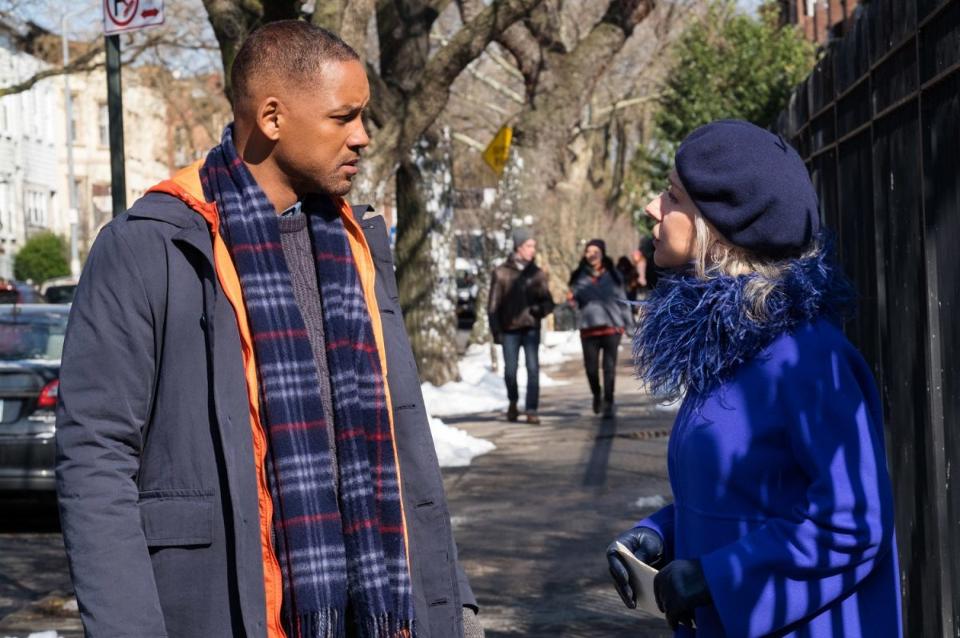
With Christmas time comes awards season, and every so often a film comes along that attempts to tackle both markets – deliver a heartfelt drama set around the holidays that will bring people into the cinema after they’ve finished exchanging gifts; while voters cast the film on their award season ballot. Such a forced ploy rarely works and it won’t surprise you that this year’s attempt, Collateral Beauty, is no different.
Note: Some plot spoilers follow.
Collateral Beauty stars Will Smith as Howard Inlet, a successful advertising executive who winds up in a spiral of pretty heavy depression after the death of his daughter, only coming into work to play with dominoes (because… healing?), while actively ignoring anyone around him as they attempt to interact.
The film takes us two years into his elongated grieving process, when those he works with – Kate Winslet, Michael Pena and Edward Norton – decide they have to do something. So they hire a private eye to follow him, partly because they’re worried about him, but mostly to try and prove he’s unstable enough to be able to make decisions without him. And though they admit it to be cruel, it seems fair enough – with scenes of Smith riding his bike into oncoming traffic, sans helmet, it seems the man has something of a death wish.
What they discover through this private eye, however, is that he has been writing regular letters to “Death” “Time” and “Love”, three concepts he had latched onto in his advertising campaigns. So they hatch an idea: what if they tried to enter his mindset and have “Death” “Time” and “Love” reach out to him in person, using hired actors as they would for an ad campaign… to essentially convince him that he’s going insane. Playing these roles we have Helen Mirren, Jacob Latimore and Keira Knightly, respectively.
Though its very concept is incredibly cruel to a grieving man and immensely problematic, as the film gets moving and the pieces actually start falling into place, there are the workings of an interesting film – even if that film has an overt desire to emotionally manipulate the audience in time for awards season. The film has assembled a phenomenal cast and it’s not quite the film the trailer leads you to expect it’s going to be. There are some enjoyable scenes between the characters as they try and come to terms with the shitty things they’re doing and the interplay between the three ad executives and the actors is at times enjoyable – Helen Mirren proving a particularly entertaining character. But by the time the film ends, anything that may have redeemed the film is shattered into a million pieces, so dramatically and unnecessarily that it will leave you audibly moaning “WHY?”
Why did the film hurt my eyes and my ears with that ending? You did NOT have to do that.
Why did all these great actors agree to be in this film? Did this all happen in the editing room?
Why did the filmmakers not watch Seven Pounds? If they had, they would have know that a film driven by a sad Will Smith didn’t work then, and it doesn’t work here.
Why did 2016 not cause enough pain for the filmmakers to think “hey, maybe we shouldn’t subject the public to more suffering?”
Though unarguably a bad film, the film is not without its positives. Maryse Alberti’s cinematography is the stand out of the film – equal parts beautiful and well crafted, wasted on a film like this. Helen Mirren’s thespian with a mission delivered the film’s best scenes, and there was something wholly fulfilling about watching Smith’s domino creations tip over, especially as accompanied by Alberti’s camerawork. But I left the screening so grossly offended and frustrated by the film’s ugly attempt at manipulation of its audience – as well as its grieving parent – and one of the worst endings I’ve ever seen, that none of this can redeem the film from its status as one of the worst of the year.
Review Score: ONE AND A HALF STARS (OUT OF FIVE)
Collateral Beauty hits Australian cinemas on 12th January 2017
———-
